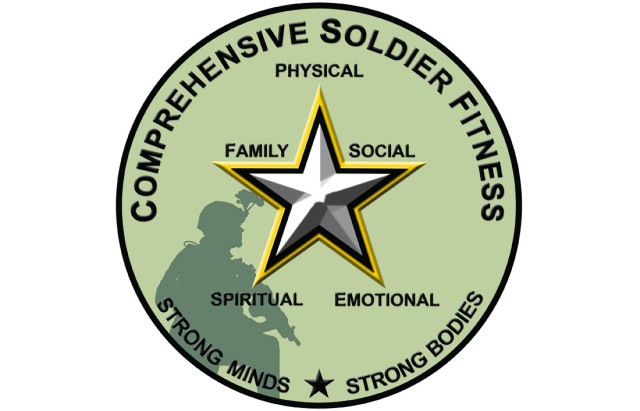WASHINGTON (Army News Service, April 18, 2011) -- Within the next couple of weeks, Soldiers will begin to see reminders that they must re-measure their resiliency and psychological health by taking the Global Assessment Tool survey again.
One reminder will be seen on the Army Knowledge Online portal. Splash screens will show an additional button under "my professional data" that will be glowing red if Soldiers have not taken the GAT a second time.
As the front-line tool for Comprehensive Soldier Fitness, the GAT allows Soldiers to assess their inner strengths in the emotional, social, spiritual and familial areas. After completing the 105-question online survey, those elements are quickly evaluated from scientifically validated scales and displayed in a graph of four bars showing weakest and strongest areas.
Soldiers can then immediately look through a variety of comprehensive resilience modules, or CRMs, and decide the areas they need to work on, and what skills they need to become more flexible in dealing with the challenges of daily life in and outside the Army.
"More so than anything else, the skills that can be learned from the modules can be applied in almost every aspect of your life, be it on deployment, in combat, back at the garrison, in your family life and civilian community," said Capt. Paul B. Lester, a psychologist with CSF. "We're not trying to teach what to think, but how to think and approach challenges, then how to negotiate those challenges."
The Army kicked off the GAT survey about 18 months ago, making it mandatory for all non-deployed Soldiers to complete on an annual basis. In February 2011, the number of Soldiers who had been assessed through the GAT reached 1 million.
Lester, who oversees CSF program evaluation, said his team is working through the many statistics involved in determining the successes of the GAT and the modules and much of what they're seeing has indicated a wide distribution of resilience already.
"We're not seeing a major difference in resilience between genders, so we know men and women are equally resilient," he said. "We're not seeing major differences between ranks, so there's a wide dispersion of psychological resilience across the force, specifically along demographic lines."
Recently, the evaluation team received data from the 2nd Infantry Division in Korea on the results of their aggressive CSF training during in-processing. Lester said the division has trained 85 percent of their force in less than a year.
"We know, based on what they're telling us, 78 percent of the suicidal gestures, ideations or attempts have come from the 15 percent of the Soldiers who for whatever reason were unable to go through the training during the initial in-processing," he said. "Those statistics are fairly strong, but we'll continue to analyze the data over time."
Initially the feedback given to Soldiers was just basic, but that has been evolved as the number of modules also increases every few months. About six months ago, the evaluation team talked with Soldiers from the bottom rung up to mid-level and strategic leaders who said they wanted help in making meaning of the scores. Feedback is now "light years ahead" of where it was a year ago, Lester noted.
Instead of receiving just a general narrative and overview of the scores, Soldiers now taking the GAT will see a tailored narrative that tells them what areas they're strong in, as well as weak in, and it will identify some potential areas where they could improve, Lester said.
Soldiers are also able to compare their scores to their peers based on age, military occupational skill, marital status, times deployed, rank and other criteria that give a better perspective of where they stand relative to others.
"For example, I get compared to thousands of other captains, and it shows me how well my scores are compared to everyone else who's a captain, so it just helps you keep your scores in perspective," Lester noted. "If you score pretty low on something, it doesn't mean you're failing, it just shows where you need to improve within your demographic lines."
The CSF folks realize psychological resilience isn't a one-size-fits-all program, so they're also working on tailoring the training specifically to the individual, he said, but that will take another year or two of development. In the next couple of years, he expects to see modules become more focused on specific issues, such as how to lose weight properly in order to make tape.
"We would really love for Soldiers to go through all our modules, but that's really not the intent," Lester said. "The intent is that over time the modules are tailored to a Soldier's needs."
Related Links:
Number of Soldiers taking GAT approaches million


Social Sharing